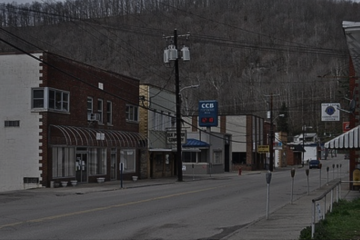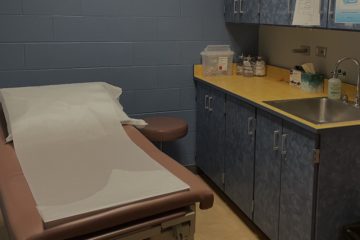by Amelia Ferrell Knisely
Grandparents raising their grandchildren in West Virginia is widespread: in most counties, it’s somewhere between 40 to 50%. In one county, well over half of the grandparents who live there report they’re raising grandkids.
As one of the nation’s most elderly states, it’s now a common experience for nearly half of all West Virginians who are grandparents, and it’s largely due to the state’s drug epidemic.
In Lincoln County, Sue Burton helps grandparents who find themselves parenting again navigate school technology, like iPads, and sends them fuel gift cards and snack bags to ease the financial load. She finds they often need laundry detergent, too.
“Most of the grandparents are on a fixed income,” she explained. “You’ve got one bed at home, then you’ve got 3 grandchildren to come into your home. Then you’ve got bedding to buy, food to buy.”
Burton is a family engagement facilitator for Healthy Grandfamilies, a free program housed at West Virginia State University that provides information and resources to grandparents raising grandchildren. Programs are available in every county, and more than 4,000 families are enrolled.
“We are here to stabilize families and keep them together,” said Melissa Lily, program director.
West Virginia leads the nation in the rate of children coming into foster care, and state health department leaders have said the drug epidemic spurred a foster care crisis in one of the nation’s poorest states. More than half of children in foster care in the state are placed with family in kinship or relative care.
Almost all of the grandparents have an immediate financial need when registering for the Healthy Grandfamilies program, Lily said.
“The immediate need is almost always beds and mattresses,” she said, noting that getting beds to grandparents in rural counties can be a challenge.
While most of the grandparents have financial needs, Lily said that they’re hesitant to reach out to the state health department for resources available to them because of fear of what could happen to the kids they’re raising. As West Virginia is bracing for a $1 billion infusion from opioid settlement money, Healthy Grandfamilies employees, who help grandparents find financial resources to take care of kids, feel it’s necessary for some of that money to help families who have been acutely impacted by the drug epidemic.
“These grandparents are raising these kids because of the drug epidemic,” said Burton, who raised two of her own grandsons. “They’re the ones that need [the money].”
The age of participants in Healthy Grandfamilies ranges from in their 30s to age 99, Lily said.
“They’re not confident to raise the grandchild because they feel they messed up raising their first child, or they wouldn’t be in this position,” Lily explained. “We have to dispel that myth that they’re not fit to raise the child.”
The program is funded by the West Virginia State Legislature, grants and others.
Participants attend eight to 10 educational discussions that touch on topics like navigating the public school and legal systems, stress management and technology.
“Most of these grandparents in Lincoln County don’t have a cell phone. They don’t know how to turn on a computer,” Burton explained.
Once grandparents complete the Healthy Grandfamilies programming, they’re connected with social workers and follow-up services that help with rental assistance, clothing, emergency food assistance and more, Lily said.
“We are giving grandparents the tools on how to raise kids in today’s world,” she said.
Grandparents, many with financial needs, fear asking the state for help
Over the next few years, West Virginia is set to receive $1 billion in opioid settlement funds that are meant to help address the ongoing drug and overdose epidemic. The record amount of money follows lawsuits against the major manufacturers, drug retailers like Walmart and CVS, and distributors Cardinal, McKesson and AmerisourceBergen.
There are few guardrails on how the money can be spent, and the bulk of the money will be overseen by a foundation that includes members hand-picked by the governor.
Burton has followed the news surrounding the settlement money, which has been announced over the last year and a half. While the money will be allocated around the state, with some funds meant for long-term and short-term use, she worries very little of it will go to families in need or the programs that help them.
“In my opinion, I would give the money to families – like the grandfamilies. The ones who basically changed their whole life around the drug epidemic,” she said.
Other nonprofits and service providers have shared similar concerns, especially because the board overseeing the funds distribution lacks diversity. As West Virginia Watch reported, “… of its 11 members, only two are women, there are no people of color and its representation of people who use drugs or who are in recovery is questionable.”
At this time, it’s not known exactly how the funds will be spent. West Virginia Attorney General Patrick Morrisey has said that money could go to law enforcement, supporting recovery efforts like treatment centers or developing substance abuse education programs.
Lily, whose program serves families directly impacted by the drug epidemic, said she could use funds for outreach at the local level.
Grandparents still don’t know the program exists, she said, meaning they’re often going without its services like food assistance and help navigating the court system. There’s also a supportive community.
When kinship caregivers, including non-family members, register with the state, they have access to monthly payments, children’s health insurance, emergency food assistance and more.
But, grandparents regularly forgo those state benefits, according to Lily, because they’re hesitant to interact with the state health department for a variety of reasons, including fear of having their grandchildren taken away.
“There’s a trust issue, so they’re not going to [the West Virginia Department of Health and Human Resources] and asking for help,” Lily explained.
She said outreach is “essential” to what they do at Health Grandfamilies, which involves telling grandparents raising grandchildren that the group is not affiliated with Child Protective Services.
“[Grandparents] still don’t know this program exists,” she said. “The education and outreach pieces, we could really use an infusion of money. For us, we can always use funding to give back to our local coalitions [for] more outreach.”
Lily added that she would like to see the opioid settlement funds also used to address mental health awareness and the state’s provider shortage. The issues limit grandparents seeking help for kids in their care; many, if not all, have experienced trauma, she said.
“There’s never enough funding for mental health treatment and counseling,” said. “We need more avenues to get [kids] treatment.”

Amelia Ferrell Knisely is an award-winning journalist with West Virginia Watch, a nonprofit newsroom. Originally from Rand, West Virginia, she has previously written for Mountain State Spotlight and the Charleston Gazette-Mail about child welfare, hunger and poverty. Ferrell Knisely also previously worked for The Tennessean in Nashville. Follow her on Twitter.



1 Comment
Clerc Daniell · January 20, 2024 at 3:56 pm
One issue raised in this article is letting people know about how to accept help. It was not addressed. How can people find out about these programs? I am in Roane County and a former child crisis worker. I would love to help spread the word.